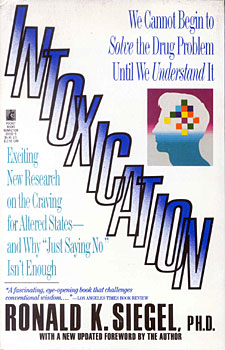
[an error occurred while processing this directive]
BACK COVER #
The questions have puzzled mankind for centuries: Why does man take drugs? What can we do about it? Now, after twenty years of groundbreaking research that has made him the leading expert in the field, psychopharmacologist Ronald K. Siegel provides intriguing--and controversial--new solutions. Intoxication, says Siegel, is a universal "fourth drive," as natural as the innate drives of hunger, thirst and sex. From goats that nibble coffee berries to bees that guzzle stupefying nectars, almost every species on earth has encountered intoxication plants--sometimes accidentally, often intentionally. Man's ingenuity has helped us become "King of the Intoxicated." Now, perhaps we can learn from the lessons of the animal kingdom:
- Llamas chew coca leaves, which contain small amounts of cocaine, with no ill effects. But when "street cocaine" is mixed in with their feed, they become irritable and hostile. (Peruvian Indians also chew coca leaves for stimulation, to reduce hunger, and to treat a variety of maladies--without any of the characteristic signs of cocaine addiction.)
- After morphine withdrawal, laboratory rats are more likely to take the drug again in the environment where the original addiction occurred, than if they are exposed to morphine in a new environment.
- Elephants in the wild love fermented fruits, but rarely eat enough to become inebriated. In experiments on game preserves, they willingly drink pure alcohol--and increase their consumption when "stressed out" by overcrowding.


